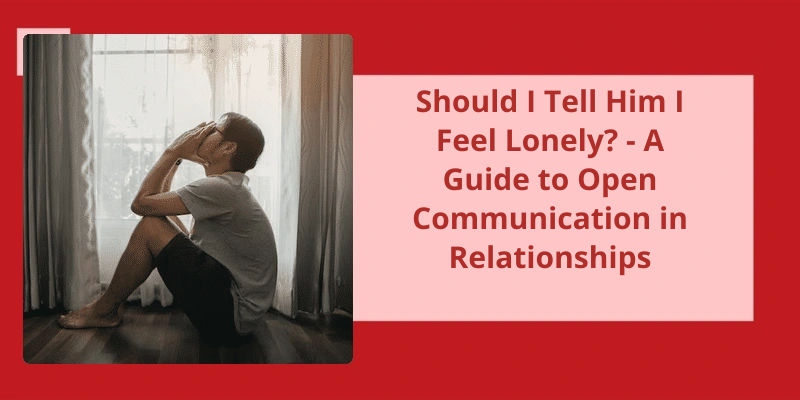As human beings, we all experience loneliness at one point or another. It can be a difficult emotion to navigate, especially when we're in a relationship. We may wonder if it's appropriate to share our feelings of loneliness with our partner. After all, we don't want to burden them or come across as needy. However, keeping our emotions bottled up can lead to resentment and a breakdown in communication. Dr. Jane Greer, a relationship expert, suggests that it's important to have an open and honest conversation with your partner about your feelings of loneliness. By approaching the conversation with a positive attitude, you can avoid putting your partner on the defensive and work together to address the issue. Ultimately, sharing your emotions can strengthen your relationship and deepen your connection with your partner.
Should You Tell a Guy You’re Lonely?
One important aspect to consider when deciding to tell a guy youre lonely is the nature of your relationship. If you barely know each other, it may come off as desperation or even creepy. On the other hand, if youre close friends or in a romantic relationship, it could be a healthy way to communicate your emotions.
It’s also worth noting that being alone doesn’t necessarily mean youre lonely. Some people prefer solitude and find comfort in their own company. However, if youre truly struggling with feelings of isolation, it may be helpful to talk to someone about it.
Another factor to consider is the guys own emotional capacity. If hes already dealing with his own issues or isn’t capable of providing emotional support, it may not be the best idea to burden him with your feelings.
Ultimately, the decision to disclose your loneliness to someone is a personal one and should be made based on your own comfort level and the potential impact on your relationship. If you do choose to share your feelings, be sure to do so in a clear and respectful manner.
It’s also important to remember that expressing your emotions doesn’t obligate the other person to “fix” your problems. Sometimes just having someone to listen and empathize can be enough to alleviate feelings of loneliness.
If you do decide to share your feelings, approach the conversation in a respectful and clear manner, and remember that it’s okay to seek help and support from others.
How to Deal With Loneliness in a Healthy Way
Loneliness can be a challenging emotion, but there are healthy ways to deal with it. Some options include cultivating a strong support network, engaging in hobbies and activities that bring you joy, prioritizing self-care, and seeking professional help if needed. It’s important to remember that it’s okay to feel lonely, and that there are strategies to cope with it in a positive way.
Opening up about our feelings can be tough, especially when it comes to loneliness. However, it’s essential to address our emotions and seek the comfort we need. One way to do this is by taking a softer approach when opening up to others, and there are ways to express how you’re feeling without outright saying that you’re lonely. One example is saying that you need more social contact in your life. Let’s explore some ways to communicate our feelings effectively without feeling uncomfortable or vulnerable.
How Do You Tell Someone You’re Feeling Lonely?
Everyone experiences loneliness at some point in their lives. Being lonely can make a person feel isolated, sad, and disconnected from the world around them. It can be challenging to tell someone that you’re lonely, especially if you fear that they may judge you or dismiss your feelings. However, acknowledging and discussing your loneliness is an essential step towards improving your mental health and well-being.
It doesn’t reflect your worth or value as a person. Rather, it’s an indication of your need for human connection and companionship. Seeking support from friends, family, or a therapist can help you feel less lonely and improve your mental health.
Tips for Building Meaningful Connections With Others and Combating Loneliness
- Join a club or group based on a shared interest or hobby
- Volunteer for a cause you care about
- Attend social events in your community
- Start a conversation with someone new
- Take a class or workshop in something that interests you
- Reach out to old friends or family members you haven’t spoken to in a while
- Plan regular outings or activities with friends or loved ones
- Use social media to connect with like-minded individuals or online support groups
- Practice active listening and responding to others
- Consider therapy or counseling to work through any underlying issues that may be contributing to feelings of loneliness
Source: How to tell somebody that I’m really lonely without coming …
Feeling lonely in a relationship can be a difficult emotion to deal with. It’s easy to assume that being in a relationship means you should never feel lonely, but the truth is that it’s a common experience. Fortunately, there are ways to work through those feelings and strengthen your relationship in the process. Here are some strategies to consider.
How Do You Express Feeling Lonely in a Relationship?
Feeling lonely in a relationship can be incredibly difficult to navigate. It can leave you feeling upset, confused, and disconnected from your partner. While it’s normal to feel lonely from time to time, if youre finding that this feeling is persistent, it’s important to address it head-on. The first step is to discuss your feelings with your significant other. Be honest and vulnerable about how youve been feeling and ask for their support in working through it.
Another way to combat your feelings of loneliness is to take a break from social media. Social media can often perpetuate feelings of inadequacy and loneliness, which can be detrimental to your mental health. Instead, try unplugging for a bit and focusing on real-life connections and experiences. This can be a great way to reconnect with yourself and your partner.
Doing something nice for your significant other can also help to alleviate feelings of loneliness. It’s easy to fall into a routine and take each other for granted. By doing something kind, thoughtful, and unexpected, you can remind each other of why you fell in love in the first place.
Volunteering is another great way to combat loneliness. Not only does it give you a sense of purpose, but it can also help you to connect with others and form meaningful relationships. By giving back to your community, you can start to see the bigger picture and take the focus off of your own feelings of loneliness.
Sometimes all it takes is a good hug to make you feel better. Physical touch is a powerful way to connect with others, and it can help to alleviate feelings of loneliness. Take the time to hug your partner and let them know how much they mean to you.
Finally, consider nurturing other relationships in your life. While your significant other is an important part of your life, it’s crucial to have a support system outside of your relationship. Whether it’s with friends, family, or a therapist, having a network of people you can turn to can make all the difference in combating feelings of loneliness.
It’s not uncommon to feel lonely at times, especially when your life is lacking excitement or stimulation. Staying busy with work, hobbies, and other activities can help alleviate feelings of loneliness, but there may still be certain people who leave a significant void in your life. Missing someone special is a unique experience that can be overwhelming and difficult to distinguish from general loneliness. So, how can you tell if you miss him or if you’re just feeling lonely?
How Do I Know if I Miss Him or I’m Just Lonely?
It’s natural to feel lonely sometimes, even when you’ve a lot going on in your life. We all have moments where we crave the presence of someone else, whether it’s a partner, a friend, or a family member. However, it can be difficult to know whether youre feeling lonely because you miss your ex-partner or because you genuinely just want someone around.
Another way to distinguish between these feelings is to look at your behavior. When youre truly missing someone, you may find yourself constantly thinking about them, daydreaming about what you’d say to them if you were together again, or even reaching out to them in some way. However, when youre just feeling generally lonely, you may find yourself seeking out any kind of social connection, whether thats through social media or by reaching out to acquaintances you havent spoken to in a while.
It’s important to note that theres no right or wrong way to feel in this situation. It’s normal to miss someone you cared about deeply, even if you know youre better off without them. The key is to be honest with yourself about what youre feeling, and to take steps to address those emotions in a healthy way.
If youre missing someone, consider reaching out to them to see how theyre doing. However, make sure youre doing this because you genuinely want to reconnect with them, not just because youre feeling lonely. On the other hand, if youre feeling lonely, try to make an effort to connect with new people. Join a club or group related to one of your hobbies or interests, or attend a social event in your area. By putting yourself out there, you may find that youre able to make new connections and build a more fulfilling social life.
The most important thing to remember is that it’s okay to feel however youre feeling. Emotions are complex, and it’s natural to have conflicting feelings about a past relationship. Just be kind to yourself, and focus on taking steps that will help you move forward in a positive way.
The impact of loneliness on one’s health has been widely studied and debated. However, a recent study published in Psychiatry Research suggests that it may pose as much of a risk to middle-aged men’s health as smoking or being overweight does. The study involved over 2,500 men aged 42 to 61, who were followed for over two decades to investigate the potential consequences of loneliness.
Is Loneliness Bad for a Man?
The results revealed that those who reported feelings of loneliness and isolation were more likely to experience serious health issues and even death due to various conditions such as heart disease, cancer, and stroke. In fact, the risk of mortality for lonely men was found to be almost twice as high as those who felt socially connected.
This is a concerning finding, considering that many men often struggle with expressing their emotions and building deep connections with others. Societal expectations of masculinity can often discourage men from seeking help or reaching out for social support, which can lead to feelings of loneliness and isolation.
It’s important to acknowledge that loneliness isn’t an inherently bad emotion, but rather, it’s the chronic feelings of loneliness and isolation that can have negative effects on physical and mental health. Therefore, it’s crucial for men to prioritize developing and maintaining meaningful relationships with friends, family, and romantic partners to prevent loneliness from becoming a chronic issue.
One way to combat loneliness is to engage in activities that promote social connection and community, such as joining groups or clubs that align with your interests or volunteering in your local community. Additionally, seeking out therapy or counseling can provide a safe space to explore and address underlying issues contributing to feelings of loneliness and isolation.
The Impact of Loneliness on Mental Health and Well-Being in Men
Research suggests that loneliness can have a negative impact on men’s mental health and overall well-being. Men who experience chronic loneliness are at higher risk for depression, anxiety, and other mental health issues. This highlights the importance of social connections and support systems for men, and the need to address and combat loneliness in order to promote better mental health outcomes.
Conclusion
In order to nurture a healthy relationship, it's important to be open and honest with your partner about your feelings. If you're feeling lonely, it's better to express that to your partner rather than keeping it all inside and potentially causing resentment or miscommunication. By starting the conversation on a positive note and emphasizing that the goal is to improve the relationship, both partners can work towards finding solutions or practices that can help alleviate the loneliness. It may be difficult to speak up at first, but ultimately, being honest about your emotions can lead to a deeper understanding and connection between you and your partner.






